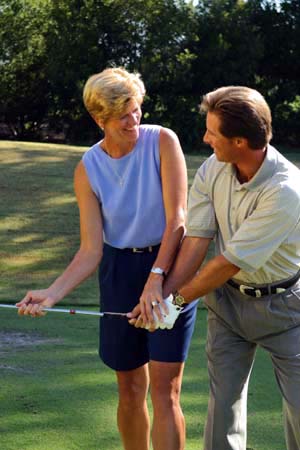|
Tar Heel Travels
Swing Schools
Why golfers from around the nation travel here to improve their game
 By Bill F. Hensley By Bill F. Hensley
During
the course of her job each day, Dana Rader (left, in picture at right)
will wear many hats — teacher, author, promoter, administrator, public
speaker, golf show host, video producer, confidant and den mother to a large
instructional staff at her popular golf school in Charlotte. Now she has added
“travel promoter” to her list of activities since happily discovering that
the school is a major travel attraction, bringing in students from around the
nation for extended stays at Ballantyne Resort.
Noted teachers Peggy Kirk Bell of Pine Needles and Eric Alpenfels of Pinehurst
could have told her so. The golf schools they head play a major role in resort
marketing and help bring in a large number of students/guests throughout the
year for golf instruction. The idea is to learn thoroughly amid luxurious
surroundings, a feature that somehow escapes other schools.
“For years, a vast majority of our students — probably 75 percent — were
from the greater Charlotte area,” Rader explains. “But recent statistics
show that our market has expanded rapidly, and we are now attracting students
from everywhere: California, Canada, the Northeast — you name it.”
Each of the golf school directors credits widespread publicity, videos, books
and word-of-mouth advertising for their teaching and tourism success. The
schools are often featured in national golf and travel publications, and the
Rader school was the subject of a recent Southern Living article.
“The main emphasis, of course, is on quality golf instruction that covers the
entire game,” offers the renowned Bell who, with her late husband, Bullett,
pioneered golf schools more than 40 years ago. “But the fact that you can also
offer outstanding accommodations, food, service and facilities certainly
doesn’t hurt.”
Shortly after buying the Pine Needles resort in Southern Pines in the mid-1950s,
Bell began a series of golf schools she called Golfaris to help men, women and
juniors improve their games. The schools, now legendary, usually last five days
and are held frequently. “We will have up to 150 students in each school,”
she says, “and most of the participants will be from out of our immediate
area. It’s amazing how much a player can learn by playing, eating and sleeping
golf for the better part of a week.”
It’s the same situation at Pinehurst where Alpenfels directs the Golf
Advantage School that attracts thousands of wannabe golfers to the prestigious
resort. “Our students come from around the globe for comprehensive
instruction,” he says.
At each of the highly successful schools, excellent facilities and
instructors are the first requisite. Each has spacious indoor and outdoor
practice areas, the latest technical equipment, classrooms, swing aids, putting
greens, practice bunkers and a nearby golf course for play. Pine Needles also
has a four-hole practice course that adjoins the teaching area.
“We like a four- or five-to-one ratio at our schools,” Alpenfels says, “so
that means we have to have 10 or 12 top instructors for each session.” Rader
and Bell agree, and each of their schools provides a full staff of certified,
professionally trained and accredited teachers.
In additions to schools for men, women and juniors throughout the year, clinics,
corporate outings and private lessons for individuals also are offered.
“Last year, our staff spent about 8,000 hours giving individual lessons,”
Rader notes. “Though schools are our main emphasis, we do a lot of private
work.”
Principals at the three school heads have had long and distinguished careers
that led to their teaching success. All are rated among the nation’s best
teachers by the major golf publications and are sought out by top players for
swing advice. “It makes you feel important when a touring professional seeks
you out to help straighten out his game,” Bell says. “But it’s even more
fun to help a beginner break a hundred. Teaching has been the most
satisfying part of my life in golf.”
The trio had no problem in naming the most common faults that are found among
beginning students. “It’s still the basics,” says Alpenfels. “Grip,
alignment and posture. Until those three factors are correct, there is little
chance for an effective golf swing.”
Rader and Bell concur. “There are no shortcuts when it comes to the basics,”
one says as the other nods in agreement. “And we don’t offer the ‘Band-Aid
approach’ to correct a problem. We offer permanent cures.”
And what about those carefree students who try to buy a golf game, showing up at
a school with a million dollars worth of the latest, most elaborate equipment
and a 10-cent swing? “They learn in a hurry that proper equipment is
important, but that it’s not what makes a good golfer,” says Bell.
For more information, contact the Dana Rader Golf School (704-542-763; Pinehurst
Golf Advantage School (866-788-7242); and Pine Needles Golfaris (800-747-7272).
Return to magazine index
|